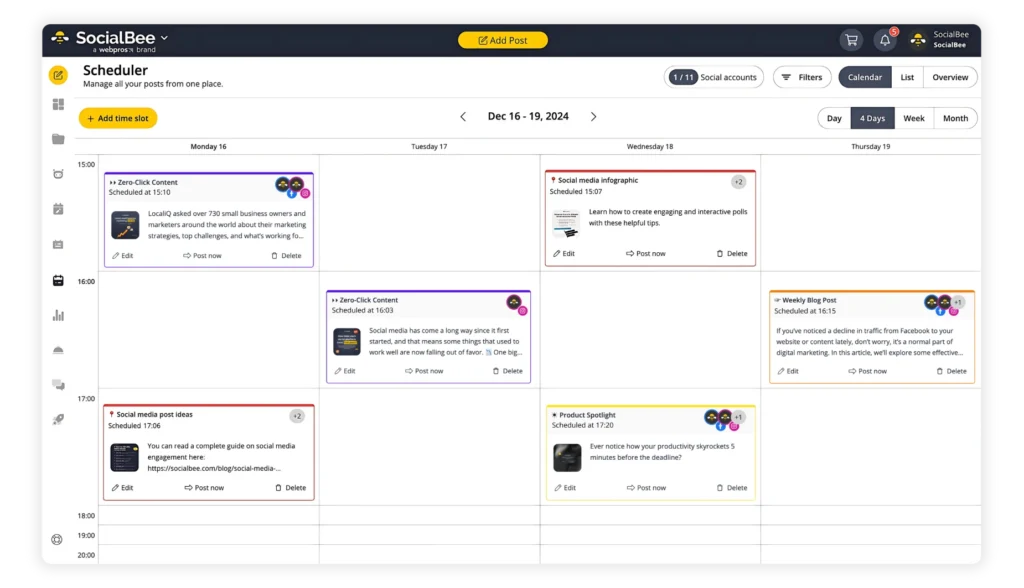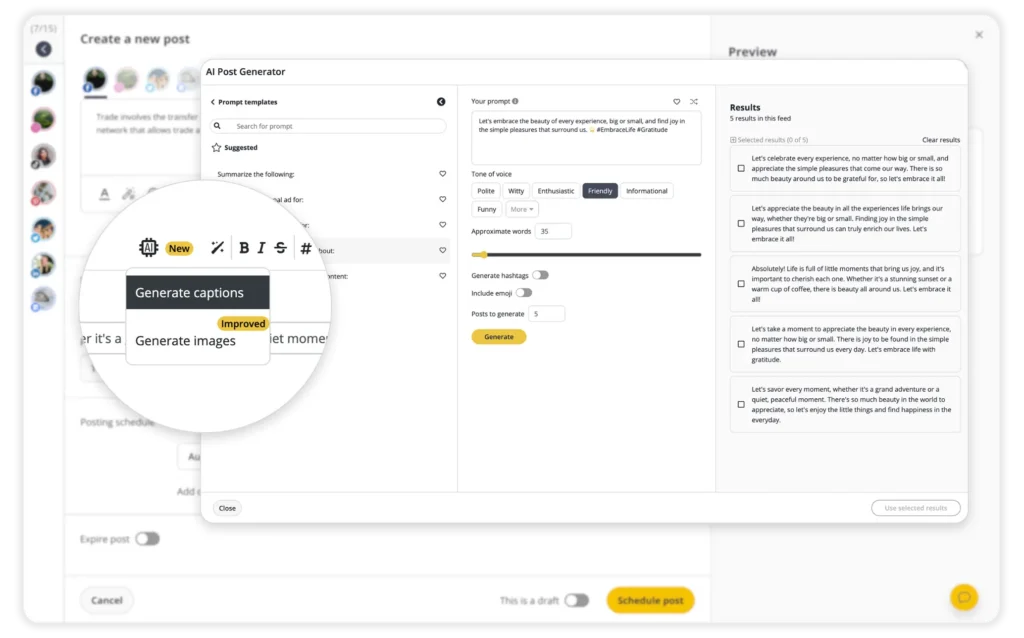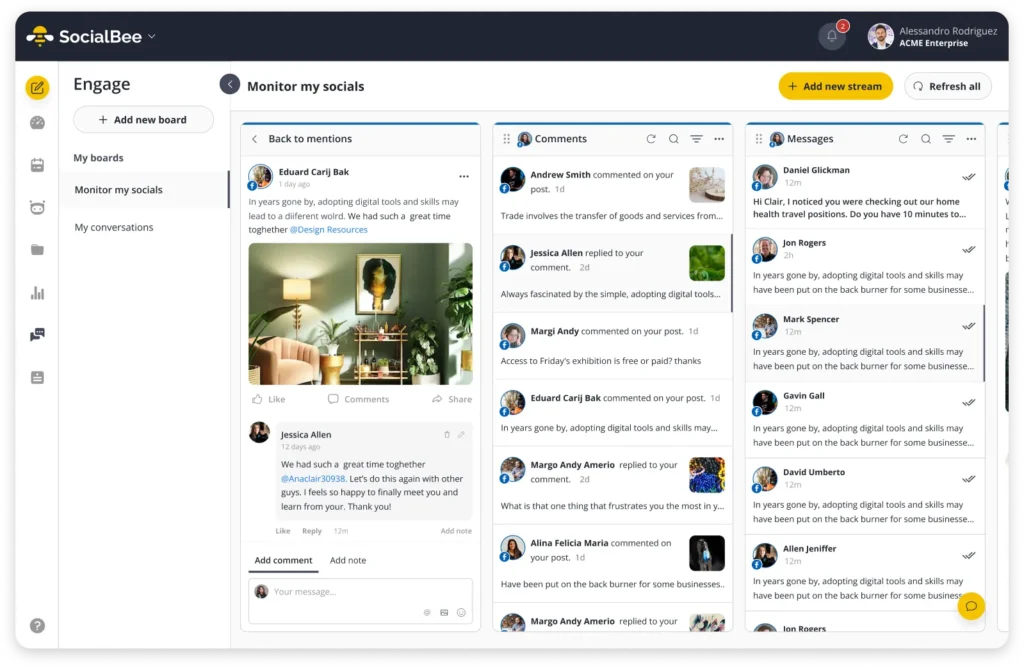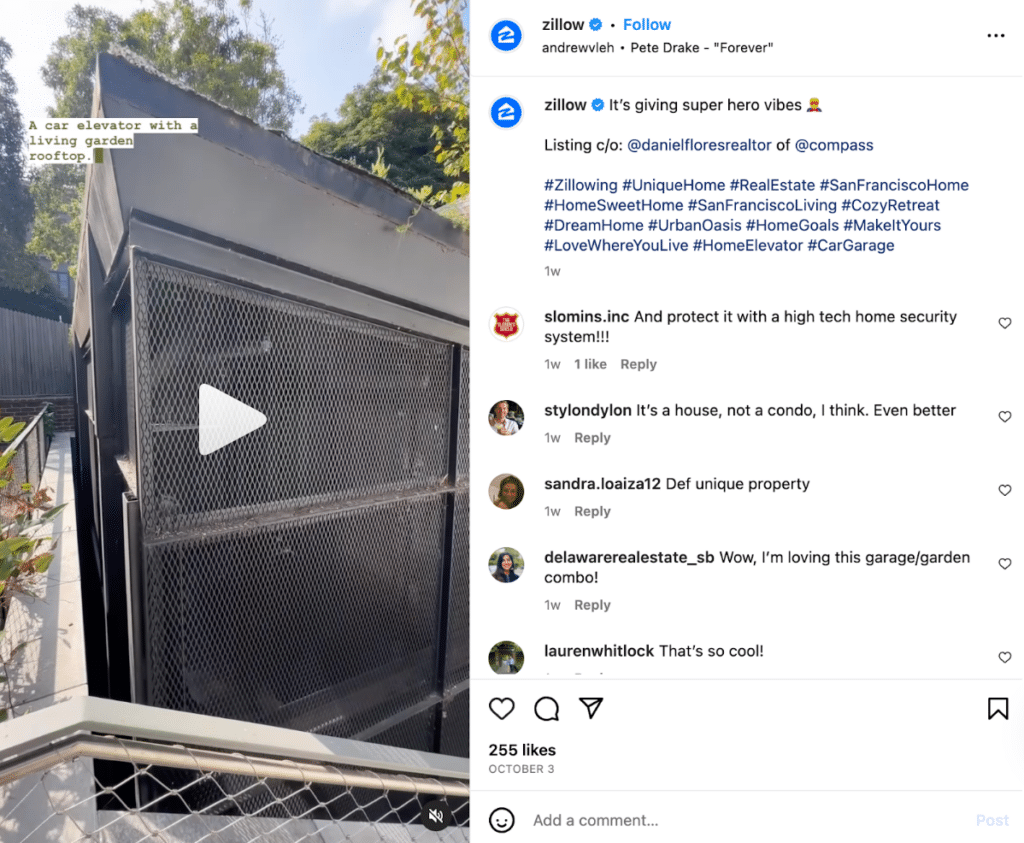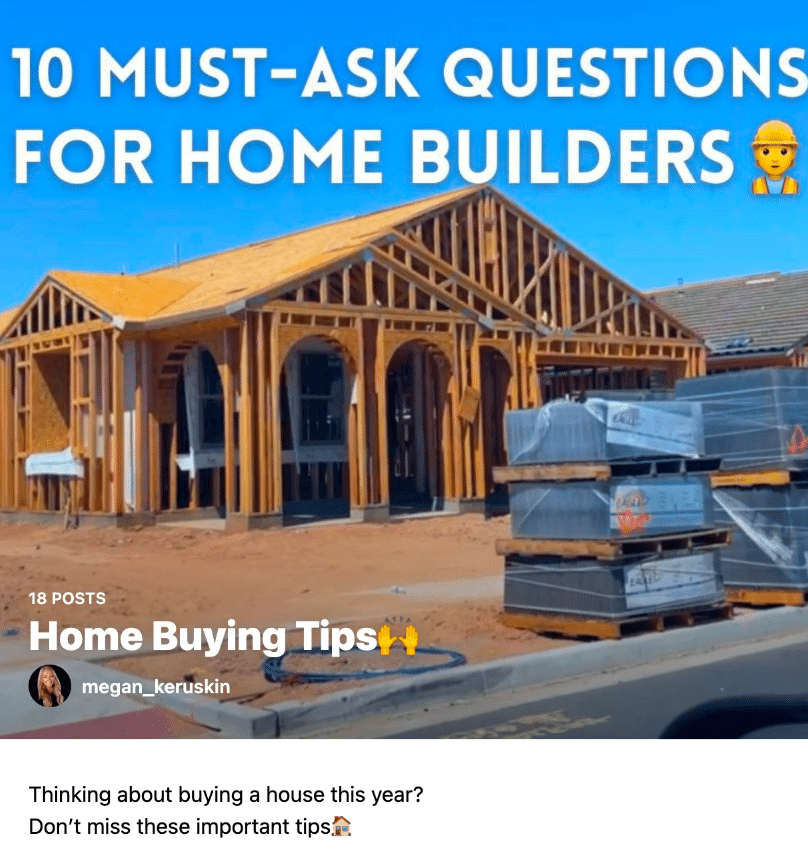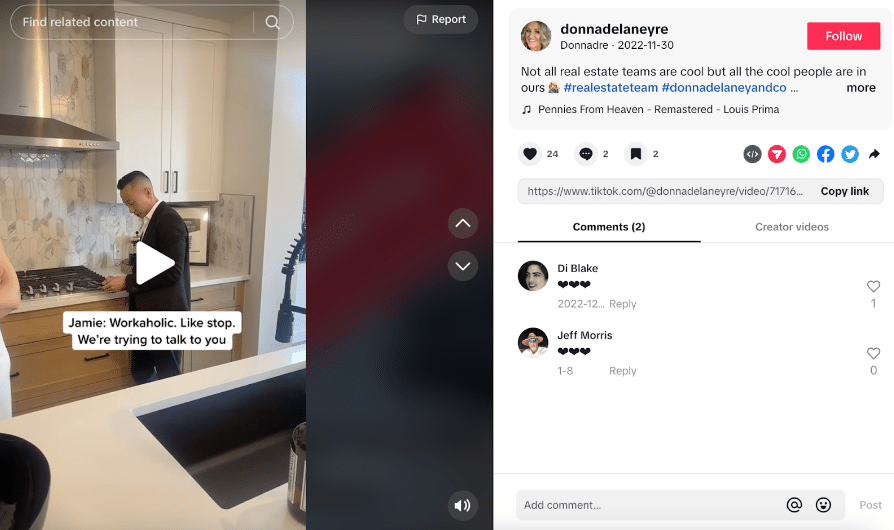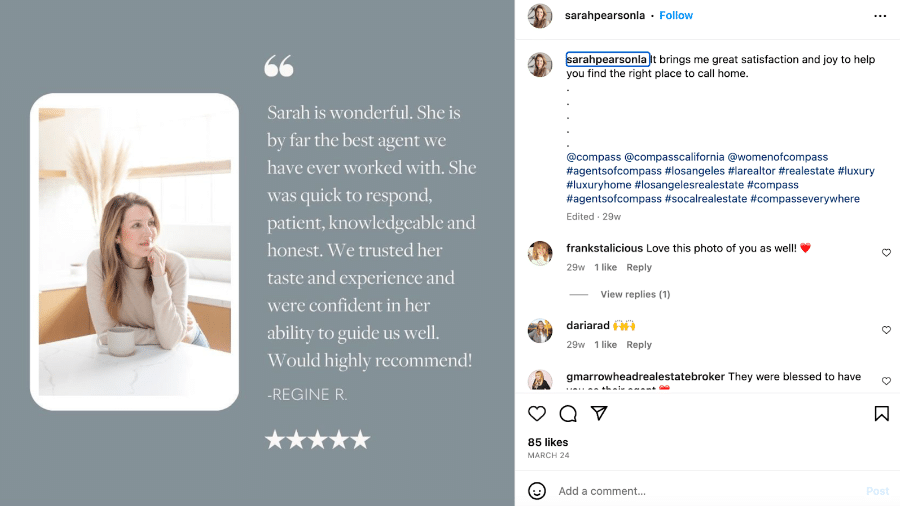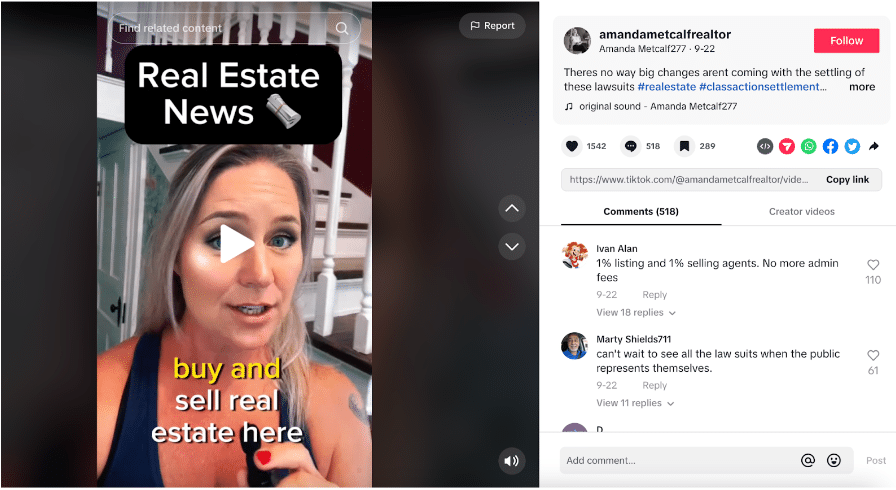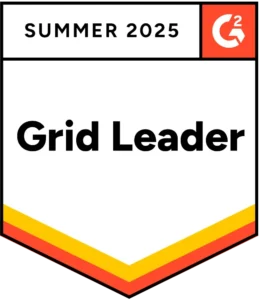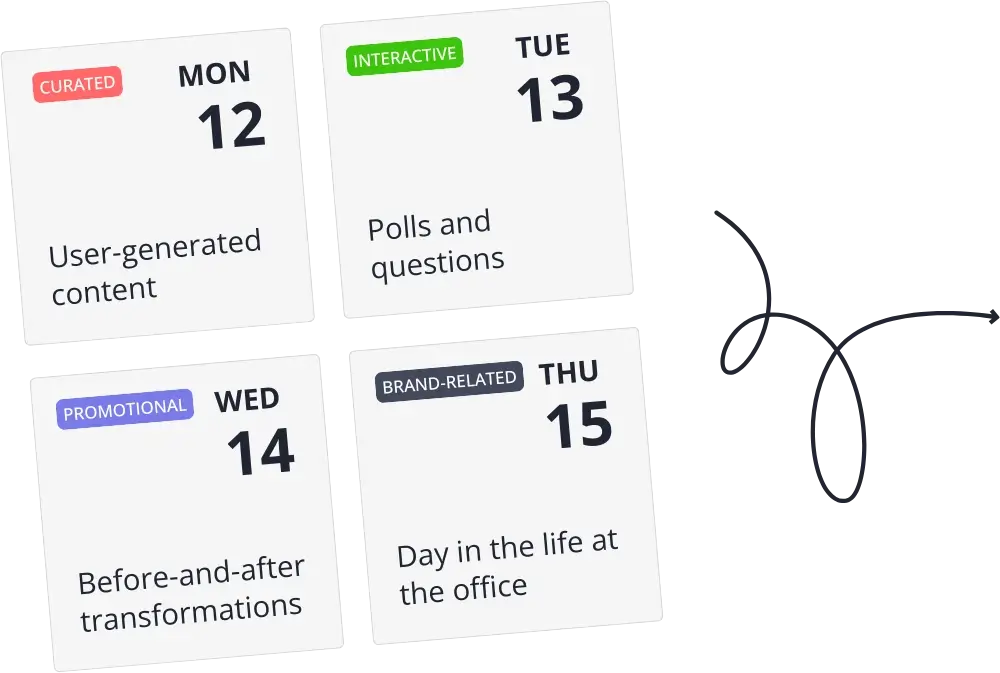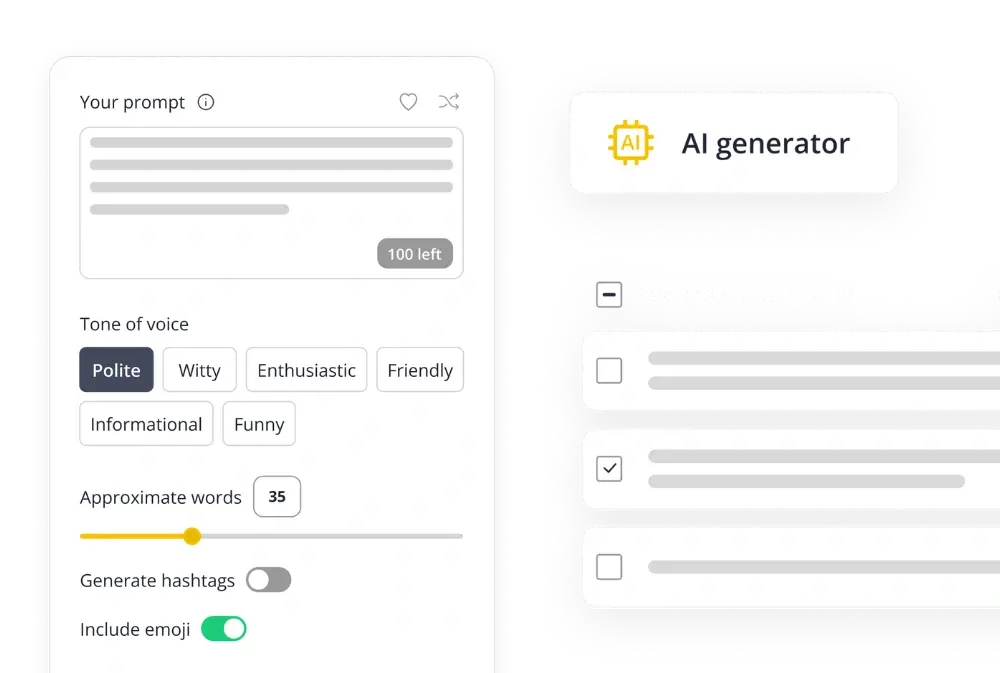Social media has become a must-have for realtors, moving from a nice extra to a key part of real estate success. With over 90% of homebuyers starting their search online, having a strong and engaging presence is more important than ever.
Nearly half of real estate agents (46%) who actively share content on platforms like Facebook, Instagram, and Twitter see big boosts in leads and sales.
But just being on social media isn’t enough. This guide is here to help you create content that grabs attention, builds trust, and turns online followers into real clients.
We’re SocialBee LABS SRL, part of WebPros. We use the information you provide to share relevant content and product updates, as outlined in our Privacy Policy. You can opt out anytime.

Short Summary
- Realtor social media content is crucial for success in today’s digital landscape, where 90% of homebuyers start their property journey online.
- Active crafting and sharing of engaging content on platforms like Facebook, Instagram, and Twitter can significantly boost lead generation and sales for real estate agents.
- Creating engaging social media posts can enhance brand visibility, community engagement, and lead generation for real estate agents.
- To create a successful real estate social media strategy, agents should define goals, choose the right platforms, create high-quality content, engage with the audience, and analyze and adjust their strategy.
- Social media platforms like Facebook, Instagram, TikTok, and LinkedIn can be effective tools for real estate agents, depending on their target audience and content type.
Why Should A Real Estate Agent Create Social Media Posts?
The importance of an online presence cannot be understated, especially for professionals in the real estate industry.
Here are some compelling reasons why a real estate agent should create social media posts:
- Visibility and branding: Social media posts enable real estate agents to maintain a consistent online presence. By showcasing their brand, services, and properties regularly, agents can remain at the forefront of potential clients’ minds.
- Engage with the local community: Social media platforms offer an excellent avenue for real estate agents to engage with their local community. By sharing updates, events, or news related to the area, agents can foster a sense of belonging and show that they are genuinely invested in the community’s well-being.
- Showcase key details: Social media allows agents to highlight key details of the properties they represent, from stunning visuals to important facts. A well-crafted post can capture the essence of a property and entice potential buyers to explore further.
- Update on the local market: Real estate is an ever-changing industry, with fluctuations in prices, demand, and inventory. Through regular social media posts, agents can keep their audience informed about the local market’s current trends, helping potential clients make informed decisions.
- Demystify the real estate transaction: The process of buying or selling a home can be daunting for many. Through educational posts, agents can break down complex topics, offering clarity and guidance on various stages of a real estate transaction.
- Generate leads and referrals: Engaging social media posts can act as a magnet for potential clients. When current clients or followers find value in an agent’s content, they are more likely to share it within their network, increasing the agent’s reach and potential for new leads.
By creating engaging and informative social media posts, real estate agents can enhance their brand visibility, connect more deeply with their local community, and ultimately drive their business forward.
How to Create a Real Estate Social Media Strategy
Navigating the digital landscape as a real estate professional requires more than just online presence; it demands a coherent and effective strategy tailored to the unique dynamics of the industry.
Here are our tips on how to create a real estate social media marketing strategy:
- Define your goals and target audience
- Choose the right social media platforms
- Create high-quality content
- Engage with your audience
- Analyze and adjust your social media marketing strategy
1. Define Your Goals and Target Audience
Before diving into the vast world of social platforms, it’s essential to clearly define your goals and identify your target audience.
Are you aiming to connect with prospective buyers in a specific age bracket or demographic? Or perhaps your focus is on showcasing the charm of a local area to attract new residents? Maybe you aim to collaborate with local businesses to offer comprehensive services to potential clients.
By understanding your objectives and the needs of your audience, you can tailor your social media strategy to guide your target audience through the entire process, from initial interest to closing a deal. This clarity will ensure your efforts on social platforms resonate effectively with the right people.
A. How to Define Your Target Audience
To effectively define and connect with your audience on social media, follow the next steps:
- Start with precise demographics: Analyze age, income, and location data to create audience personas.
- Target local audiences: Use geo-targeting for neighborhood-specific content.
- Address specific needs: Tailor content to address audience desires, e.g., energy-efficient homes.
- Provide immersive experiences: Consider unique content like virtual property tours.
- Interact with your audience: Engage personally with followers, ask questions, and provide tailored suggestions.
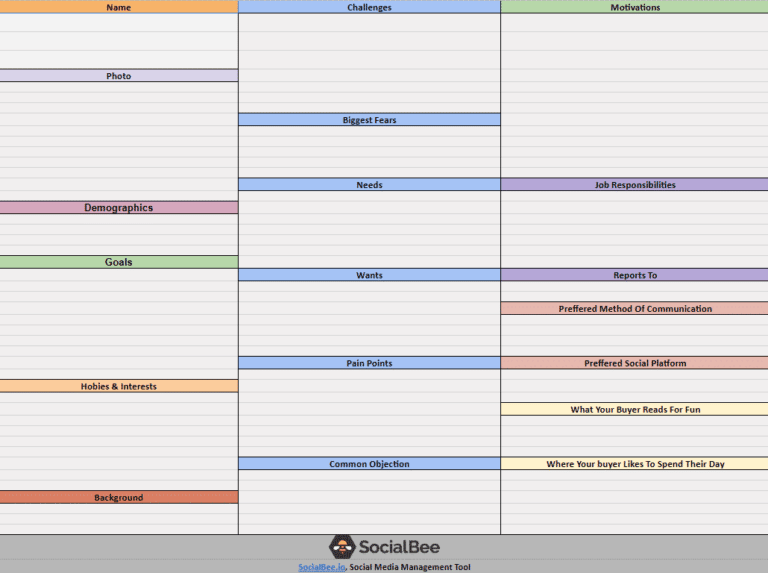
How to Establish Social Media Goals as a Realtor
Here are five specific goals every realtor should incorporate into their strategy:
- Establish credibility: Share your expertise through informative posts or videos, becoming a trusted local real estate resource.
- Build relationships: Collaborate with local influencers and businesses to expand your network and gain referrals.
- Consistent content: Maintain a regular content schedule, like “Home of the Week,” to engage your audience consistently.
- Lead generation: Use targeted ads with downloadable guides to capture leads and grow your client list.
- Conversion tracking: Measure success with analytics, optimizing based on data to increase inquiries, appointments booked, and properties sold.
Not sure where to start when defining your goals?
Here is an exhaustive list of goal examples covering various aspects of a realtor’s social media strategy:
- Brand Visibility and Awareness:
- Increase social media followers by X% within the next quarter.
- Boost brand mentions and tagged photos by encouraging user-generated content.
- Enhance brand recognition by maintaining a consistent visual identity and posting style.
- Audience Engagement:
- Increase overall engagement rate (likes, comments, shares) by X% over the next six months.
- Foster community engagement through interactive posts, surveys, and polls.
- Respond to all comments and messages within a maximum of [set time] to improve customer satisfaction.
- Content Strategy:
- Create a content calendar that covers various property types, neighborhood highlights, market trends, and educational content.
- Experiment with different content formats (videos, infographics, stories) to diversify the content mix.
- Monitor content performance and refine strategies based on audience engagement and feedback.
- Lead Generation:
- Increase website traffic from social media by X% in the next quarter.
- Generate a specific number of high-quality leads per month through lead capture forms.
- Implement targeted ad campaigns to drive potential clients to your lead capture pages.
- Customer Relationship Management (CRM):
- Use a CRM tool to track and nurture leads obtained from social media.
- Set up automated email follow-up sequences for lead nurturing.
- Personalize interactions with potential and existing clients based on their preferences and behavior.
- Reputation Management:
- Monitor online reviews and ratings regularly, responding to both positive and negative feedback.
- Showcase positive client experiences through testimonials and success stories.
- Proactively address any negative comments or concerns to maintain a positive online reputation.
- Metrics and Analytics:
- Establish key performance indicators (KPIs) for each goal and regularly measure progress.
- Analyze social media metrics such as click-through rates, conversion rates, and engagement rates.
- Use analytics data to make data-driven decisions and optimize your social media strategy.
- Education and Training:
- Stay updated on social media trends and best practices in real estate marketing.
- Provide ongoing social media training to your team or colleagues to ensure consistency in branding and messaging.
2. Choose the Right Social Media Platforms
Understanding the different social media channels can be daunting, but it’s crucial to select the platforms that align best with your real estate expertise and audience. Not every channel will be suitable for your target demographic.
For instance, while Instagram might be perfect for visually showcasing properties, LinkedIn can serve as a platform to highlight your industry knowledge and network with other professionals. By strategically choosing and using the right social media channels, you can effectively reach your prospective clients and generate more leads.
- Assess platform popularity: Research which platforms your target audience frequents the most.
- Consider content type: Recognize that different platforms favor different content types.
- Perform competitor analysis: Monitor where your competitors are most active and where they receive the most engagement.
- Check engagement metrics: Regularly evaluate which platforms generate the most interactions for your posts.
To enhance these strategies, consider incorporating SocialBee, an AI-powered social media management tool designed to streamline all your tasks in one place.
Manage your real estate social media strategy from SocialBee.
Here are some SocialBee features that can help you focus and tailor your strategy for the right social media channels:
- Tailored content creation: Let SocialBee’s AI social media manager tailor and implement an effective social strategy for your brand. Moreover, utilize the AI content generator to create and customize your posts for each platform in seconds without compromising on quality.
- Broad platform support: SocialBee supports posting on Facebook, Instagram, Threads, X (Twitter), LinkedIn, Pinterest, Bluesky, Google Business Profile, TikTok, and YouTube.
- In-depth insights: Dive into analytics to identify your audience demographics, measure the effectiveness of your strategy, monitor account growth, and assess the impact of individual posts.
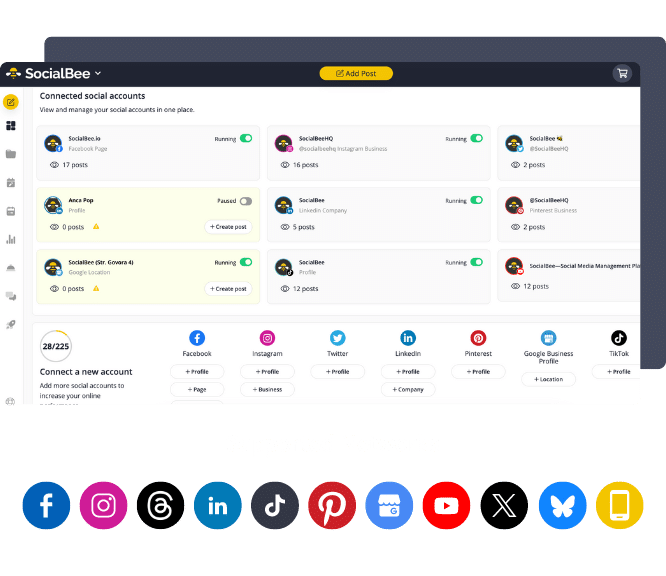
3. Create High-Quality Content
To truly resonate with your audience, it’s imperative to produce and share high-quality content that reflects your expertise and the vibrancy of the properties you represent. Consider using your own photos, especially when highlighting the unique features of a listing, as it adds a personal touch and authenticity to your posts.
Cater to first-time buyers by offering practical tips, insights, and guidance to ease their journey into homeownership. Remember, a high-quality photo paired with relevant and engaging content can make a significant difference in capturing the attention of potential clients.
To ensure a consistent flow of fresh and intriguing content ideas, leverage SocialBee’s AI post generator, a tool designed to assist in generating captivating social media posts tailored to your niche.
Generate AI-powered content for your social media channels with SocialBee.
Start your 14-day free trial now!
Here’s how to use SocialBee’s AI content generator to create real estate social media posts:
- Use ready-to-go prompts: Browse through our collection of real estate content creation prompts and get inspired by new post ideas.
- Customize your posts: Do you have to share the same post on all your socials? Make sure it’s tailored for each platform by asking our AI to adjust the content accordingly.
- Turn ideas into content: Do you have a specific post idea in mind? Write a detailed prompt describing your vision and let SocialBee’s AI bring it to life.
- Fine-tune your requests: Stay in control of your content by adjusting the length of your generated content, choosing the ideal tone of voice, and controlling how emojis are used in your content.
4. Engage with Your Audience
Active engagement with your audience is paramount. It’s not just about broadcasting listings or showcasing your latest successes; it’s about creating a two-way communication channel. Highlight collaborations with local businesses to underscore your connection to the community and its offerings.
Encourage your team members to interact with potential customers, offering valuable information and answering queries. Such interactions can provide the reassurance and insight a prospective buyer needs while searching for their dream home.
Remember, every comment, mention, or direct message is an opportunity to foster trust and establish a rapport with someone who could be your next client. For a more streamlined process of managing these interactions, use SocialBee.
Maintain a strong social media presence by swiftly addressing every comment and mention.
Start your 14-day free trial now!
With its comprehensive features, you can effortlessly keep track of mentions, comments, and DMs, ensuring no touchpoint with your audience goes unnoticed.
5. Analyze and Adjust Your Social Media Marketing Strategy
Continuous reflection and adjustment of your marketing approach are crucial. By regularly evaluating your efforts, you can pinpoint areas of improvement and avoid repeating the same mistakes.
Whether it’s missing the prime time to post, failing to engage sufficiently on an event page, or any other oversight, each offers a valuable learning opportunity. Repeat business often stems from clients who feel continuously engaged and valued. Thus, sharing photos, updates, and important content can foster and deepen these client relationships.
Moreover, creating content is just one piece of the puzzle. It’s equally vital to actively monitor and engage with the feedback you receive. Comments on a property listing, mentions in broader real estate talk, or discussions on various platforms can provide valuable insights.
These interactions can guide you in determining what’s resonating with your audience and highlight areas that might need adjustments. Staying proactive in this manner ensures your strategy remains agile and effective, catering to the ever-changing demands and preferences of your audience.
10 Social Media Post Ideas for Real Estate Agents
To make an impactful online presence, it’s essential to curate engaging content.
Here are some real estate social media post ideas and recommendations:
- Showcase your new listings to potential clients
- Offer home-buying tips and showcase your real estate expertise
- Post behind-the-scenes content
- Share testimonials from previous clients
- Narrate personal stories
- Collaborate with local experts
- Offer free resources for real estate advice
- Post real estate memes
- Host a live session
- Share local news
1. Showcase Your New Listings to Potential Clients
When unveiling new listings, it’s paramount to present them in a way that captivates potential clients. Highlight the unique features of each property and its proximity to popular local businesses, enhancing its appeal.
Moreover, share photos that look good. Make sure the lighting and the angles are good and that you emphasize the best features about your listing. Here is an example of a property video from Zillow:
On top of hosting live open houses, consider hosting virtual open house events and promoting them on social media to expand your audience reach. Through effective showcasing, you not only present the property but also position yourself as the go-to expert in your domain.
2. Offer Home Buying Tips and Showcase Your Real Estate Expertise
The real estate market, especially for first-time homebuyers, can be overwhelming. By offering home-buying tips, you position yourself as a knowledgeable guide, providing valuable insights to those embarking on one of the most significant purchases of their lives.
Moreover, consistently showcasing your expertise can elevate your brand, fostering trust among potential clients and distinguishing you from competitors.
Here are some post ideas to offer local tips:
- First-time buyer’s guide: Craft a comprehensive guide tailored for newcomers. Break down the steps, from pre-approval processes for mortgages to understanding closing costs. Ensure the content is digestible, possibly using infographics or videos to illustrate the points.
- Local market insights: Regularly share updates about the local real estate market. Discuss current trends, median home prices, and neighborhood desirability scores. This not only keeps your audience informed but also underscores your deep familiarity with the locale.
- Home maintenance tips: Post about seasonal home maintenance checks, renovation ideas, or even simple DIY fixes. You can also share information about home improvement loans for clients looking to finance larger renovation projects. This positions you as an agent who cares about the long-term satisfaction of their clients, even post-purchase.
- Neighborhood guides: Highlight the charm and benefits of various localities. Dive into school rankings, local parks, upcoming infrastructure projects, or even popular eateries. Such neighborhood guides can be invaluable for those unfamiliar with the region.
- Ask the expert sessions: Host regular Q&A sessions, either live on platforms like Instagram or as part of a weekly blog. Address common concerns, debunk myths, and provide advice based on recent market shifts.
- Client success stories: Showcase stories of previous clients who, with your guidance, found their perfect home or secured a great deal. Narrating these tales reinforces the tangible results of your expertise.
- Collaboration with other professionals: Invite mortgage brokers, home inspectors, or interior designers to share their insights. This provides a holistic view of the home-buying process and further strengthens your image as a well-connected industry expert.
Here is an example of an Instagram guide shared by a local expert:
Over time, these efforts can lead to stronger brand loyalty, word-of-mouth recommendations, and increased trust in your expertise.
3. Post Behind-the-Scenes Content
Delving deeper into the day-to-day workings of your agency provides an authentic, relatable touch that can create a more profound connection with potential clients.
This transparency not only showcases the effort and dedication involved in every transaction but also introduces the passionate individuals behind each success.
Here are some possible types of behind-the-scenes content:
- Staging secrets: Share the journey of transforming a house into a ready-to-show property. From choosing the right decor to setting the perfect lighting, these glimpses can intrigue and educate potential buyers.
- Deal diaries: Document the ups and downs of finalizing a deal, capturing the negotiations, the problem-solving, and the ultimate satisfaction of closing.
- Meet the team: Regularly spotlight different team members. A brief interview about their role, experiences, and even their favorite property can help clients relate to and trust the people they might be working with.
- Team dynamics: Sharing moments from team brainstorming sessions, training days, or even casual get-togethers can underscore the camaraderie and collaboration that defines your agency.
- Client meetings: Showcase snippets (with client permission) from initial consultations, capturing the essence of building rapport and understanding client needs.
Here is an example of how you can make a behind the scenes post fun:
Showcasing the dynamics of your team and using a bit of humor in your social media posts can set you apart from the competition. So, don’t be afraid to put a spotlight on your team and their defining characteristics.
4. Share Testimonials from Previous Clients
The power of a personal recommendation can’t be overstated. In an era where consumers often look to reviews and testimonials before making decisions, providing authentic feedback from satisfied clients can greatly enhance your credibility and appeal.
Here are some testimonial-based social media post ideas:
- Video testimonials: Real, unfiltered feedback from past clients can resonate deeply with potential customers. Encourage those you’ve assisted to recount their experiences on camera. Whether it’s the relief of a first-time buyer or the gratitude of a seller who secured a fee above the current average selling price, these genuine narratives can serve as powerful endorsements.
- Success stories: Every deal has its intricacies. By detailing some of the more complex transactions, you can highlight your problem-solving skills, perseverance, and expertise. Break down the challenges faced and the strategies employed, offering insight into the intricacies of the real estate trade.
- Client celebrations: Real estate isn’t just about brick and mortar; it’s about dreams realized and new beginnings. Share snippets from events like housewarming parties or post-move-in celebrations. These moments underscore the emotional payoff of a successful transaction.
Here is an example of how you can share your customer testimonials on social media:
To amplify the impact of these testimonials, carve out a dedicated space on your website or primary social platform. This “Client Stories” section can serve as a repository of trust, available for prospective clients to explore and be inspired by.
5. Narrate Personal Stories
In the competitive world of real estate, personal stories are a potent tool to foster deeper connections, differentiate yourself, and showcase your authenticity. They transcend the typical property descriptions and statistics, offering your audience a peek into your soul, values, and the very ethos that drives your work.
Every journey has its origin, a defining moment or series of events that sets the path forward. Your initiation into real estate might have been a deliberate choice, a happy accident, or perhaps an inherited family business.
By sharing your entry into this field, you grant your audience an intimate look into your motivations, passions, and commitment. Was it a specific property that caught your eye? Or maybe a mentor who showed you the ropes?
6. Collaborate with Local Experts
When it comes to real estate, the property is just one piece of the puzzle. The surroundings, the local culture, the amenities – these all play a pivotal role.
Collaborating with local experts not only enhances the depth and variety of your content but also reinforces your position as a well-connected and informed real estate agent.
Here are some social media post ideas for real estate collaborations:
- Guest posts: Enhance the richness of your content by inviting local experts to share their knowledge. A local historian could provide insights into the evolution of popular neighborhoods, an architect could elucidate the nuances of iconic buildings, and an interior designer might offer trendy decor tips for new homeowners.
- Joint live sessions: Live sessions on platforms like Instagram or Facebook can be tremendously engaging. Team up with local figures like mortgage consultants, landscape artists, or even craftspeople to host informative Q&As. These sessions can be a treasure trove of information for homeowners and potential buyers.
- Community spotlights: Local businesses are the lifeblood of any community. Spotlighting them not only promotes community spirit but also helps potential buyers appreciate the amenities and culture of an area. Feature the favorite local bakery, the family-run hardware store, or the vibrant farmer’s market – weaving narratives on how these entities shape and enrich the local living experience.
7. Offer Free Resources for Real Estate Advice
Knowledge is power. Offering free, valuable resources not only positions you as a trusted expert but also nurtures relationships with both current and potential clients.
Develop comprehensive guides on the home buying process, checklists for first-time buyers, or even eBooks on maximizing property value.
Moreover, conducting webinars or workshops on understanding mortgages, property taxes, or the nuances of property valuation can also set you apart.
These resources become your silent ambassadors, making clients feel supported and informed at every step.
8. Post Real Estate Memes
Laughter is universal, and a well-timed, relatable meme can lighten up your audience’s day and make your content memorable. Real estate memes can revolve around the challenges of house hunting, the euphoria of finding the perfect home, or even the occasional whimsical take on market fluctuations.
While keeping it fun, ensure your memes are tasteful and resonate with your audience’s sensibilities.
Pro Tip: Create a “Meme Monday” series where you share light-hearted content to kickstart the week on a positive note. Engage with followers by encouraging them to share their own funny real estate experiences or anecdotes.
9. Host a Live Session
Live sessions bring an immediate, interactive element to your social media engagement.
Whether it’s a Q&A about the real estate market, a virtual property tour, or an interview with a mortgage expert, live sessions can provide real-time value to your audience. The immediacy of the format allows for spontaneous interactions, building rapport and trust.
You can schedule a monthly live session on platforms like Facebook or Instagram. Promote it well in advance, ensuring maximum participation. Keep the tone informal and encourage viewers to drop their questions and feedback.
10. Share Local News
Being a real estate agent is not just about properties, but also about being deeply integrated into the local community, from understanding the neighborhood history.
Sharing local news, updates on upcoming events, infrastructure developments, or even highlighting local heroes can make your platform a one-stop hub for everything related to the community. It showcases your commitment and deep connection to the area you operate in.
Pro Tip: Collaborate with local news agencies or bloggers for regular updates. Consider having a weekly roundup, “The [Location] Digest”, giving a snapshot of everything that’s happening in the community.
Frequently Asked Questions
The most popular social media platform for realtors is Facebook. Beyond its standard features tailored for real estate professionals, such as property listing capabilities and targeted advertising, Facebook Groups play a pivotal role.
These groups allow realtors to connect with local communities, share listings, gather insights, and engage in discussions pertinent to the real estate market.
The combination of Facebook’s vast user base, multimedia sharing capabilities, and the collaborative environment of Facebook Groups makes it an invaluable tool for realtors to showcase properties, build their brand presence, and foster community engagement.
Promoting yourself as a real estate agent on social media requires a mix of personal branding, industry knowledge, and community engagement.
Here’s a brief guide to get started on social media as a realtor:
- Share client testimonials: Share positive feedback on your social media accounts to establish trust with potential property buyers.
- Add a personal touch: Offer a few details about your experiences, connecting personally with your audience.
- Engage actively: Respond to queries and provide insights to position yourself as a real estate expert.
- Share helpful news: Regularly update followers with industry trends and market insights.
- Have a consistent branding: Ensure uniformity across your social media accounts for easy recognition and professionalism.
As you incorporate these elements into your social media strategy, you will effectively portray yourself as a knowledgeable and trustworthy real estate agent.
Social media has become an indispensable tool for the real estate industry, providing a platform for agents to showcase properties and engage with potential clients.
Platforms like Instagram, TikTok and Facebook allow for the visual presentation of homes, offering virtual tours and high-quality images. These platforms also enable realtors to engage in direct communication with potential buyers, answering queries and offering timely market updates.
Beyond property promotion, social media aids realtors in establishing themselves as industry experts. By sharing market trends, highlighting local community attractions, and leveraging client testimonials, agents can build trust and credibility with their audience, all while amplifying their market reach.
Ready to Craft Your Own Realtor Social Media Content?
With the right strategies and content ideas, you can truly shine as a real estate professional agent on social media. By humanizing your brand, showcasing your expertise, and engaging with your audience authentically, you’re not just building a following – you’re building trust.
Remember, it’s not just about selling properties; it’s about creating stories, forging connections, and establishing yourself as a trusted figure in the community. Now, with all these insights and tools at your disposal, are you ready to elevate your online presence?
Dive in, experiment, and watch your digital influence grow. And if you’re looking for a robust platform to streamline all your social media efforts and interactions, look no further. Start your free 14-day SocialBee trial!


